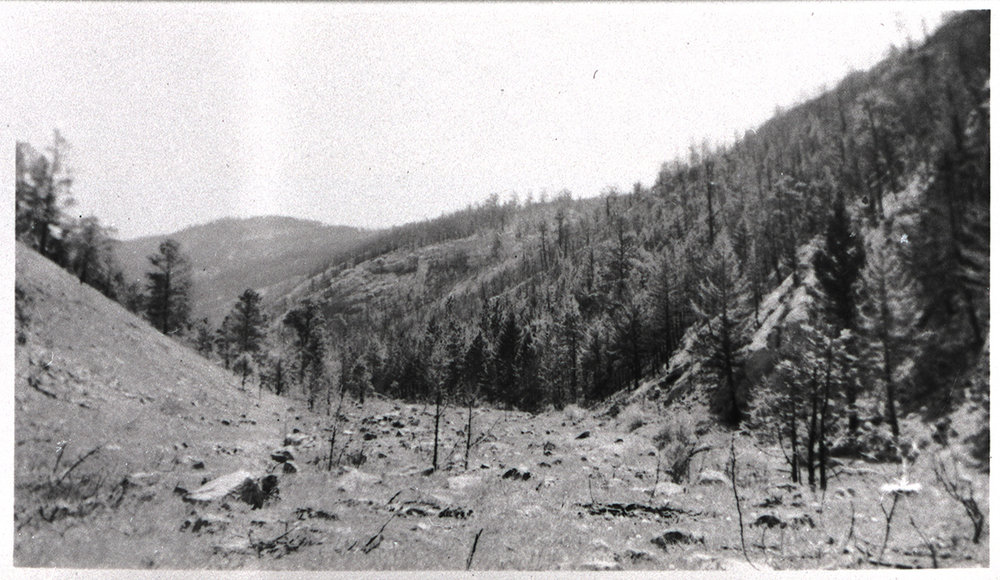75 Years After Mann Gulch Fire, Kalispell Smokejumpers to be Remembered with Graveside Tributes
The Mann Gulch Fire north of Helena killed 13 smokejumpers in 1949
By Mike Kordenbrock
Graveside memorial tributes for two Kalispell smokejumpers who died 75 years ago in the 1949 Mann Gulch Fire are planned for August 8 at the C.E. Conrad Memorial Cemetery in Kalispell.
Henry J. Thol Jr. and William J. Hellman were two of the 13 firefighters who died on August 5, 1949 after the fire, burning on a hot, windy day, blocked their route during an attempt to move to a safer location, and then burned over them as it moved at speeds estimated to be hundreds of feet-per-minute. The fire was sparked by dry lightning in the Helena National Forest in the Gates of the Mountains Wilderness area about 20 miles north of Helena. Three men survived the fire.
“These deaths were a shocking loss to the firefighters’ families and friends,” wrote the fire behavior researcher Richard Rothermel in his 1993 report “Mann Gulch Fire: A Race That Couldn’t Be Won.”
“The tragedy was also a severe blow to the Forest Service, which had not experienced a fatality during a decade of smokejumping and was extremely proud of its elite firefighters,” Rothermel continued. “Repercussions from this incident were severe and long lasting.”
The tragedy of the Mann Gulch Fire, and the circumstances that led to the deaths of the 13 men, have been the subject of considerable study and analysis, including in Norman Maclean’s 1992 nonfiction book “Young Men and Fire,” and the Mann Gulch Fire was influential in the development of modern wildland firefighting safety practices, and helped give birth to the field of fire science.
Six of the thirteen men who died were from Montana, with the remainder originally from places including Tennessee, California, Pennsylvania, New York, Massachusetts and North Carolina. The entire group had an average age of about 22. Ten of the smokejumpers killed in the Mann Gulch Fire were veterans of World War II, and they represented all branches of service. Among them were one medal of valor recipient, and two purple hearts.
Henry Thol Jr., the younger of the two men from Kalispell killed in the fire, was 19 years old at the time of his death and was in his first year as a smokejumper, with plans to use his wages to pay for his enrollment at the University of Montana in the fall of 1949, according to the U.S. Forest Service.
William Hellman, also from Kalispell, was 24 years old when he died. He was a World War II veteran and left Flathead County High School early to fight in the war, according to the Forest Service. Before his death, Hellman had ambitions to become a botany teacher.
The Kalispell graveside tribute for Thol will begin at 11 a.m. and the memorial for Hellman will begin at 11:30 a.m. The services in Kalispell will begin with introductions and a review of the Mann Gulch Fire tragedy before remarks are given about both Hellman and Thol. A moment of silence will follow, and then a prayer will be said, before the American Legion presents flags to the families. The gravestones have also been marked with new bronze medallions with the smokejumper logo and, for the first time, acknowledgement of the deceased’s involvement in the Mann Gulch Fire.
Mike Bina, the president of the National Smokejumpers Association, said that the memorial services, which are taking place across the U.S. as part of a coordinated effort to mark 75 years since the fire, are intended to also help the smokejumper community redevelop relationships with some of the families whose history is intertwined with the tragedy.
Underscoring how the pain remains alive even after all these decades, Bina told of how he spoke to a niece of Eldon Diettert, a 19-year-old smokejumper from Missoula who was among those who died in the fire. Diettert’s niece cried as she told of how her grandmother had once cried when she got the phone call telling her of her son’s death.
“There’s just not enough tears to wash away the family grief even after 75 years,” Bina said.
And the fire’s tragedy also continues to be felt by smokejumpers. Bina himself is decades removed from being an active smokejumper and retired in North Carolina from a career as a teacher for blind students. But he described a visit about two years ago to the grave of one of the smokejumpers killed in Mann Gulch Fire. Bina said that he was overcome with emotion, but couldn’t quite articulate what he was feeling. He mentioned the experience at a National Smokejumpers Association board meeting sometime after that graveside visit. Another board member suggested that Bina might be grappling with the way in which those young men and fellow smokejumpers had their lives cut short in contrast to his own.
In preparation for the graveside memorial services and other events marking the anniversary of the fire, Bina said his organization has identified nearly 80 family members of the men who died, as part of efforts to encourage family members to attend.
“It’s been a very humbling experience,” Bina said. “It’s hard to explain the emotions of it.”